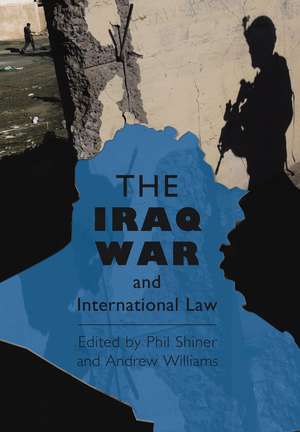The Iraq War and International Law
Editat de Philip Shiner, Andrew Williamsen Limba Engleză Hardback – 16 sep 2008
Preț: 442.04 lei
Preț vechi: 606.63 lei
-27% Nou
Puncte Express: 663
Preț estimativ în valută:
84.59€ • 90.45$ • 70.52£
84.59€ • 90.45$ • 70.52£
Carte tipărită la comandă
Livrare economică 17 aprilie-01 mai
Preluare comenzi: 021 569.72.76
Specificații
ISBN-13: 9781841136691
ISBN-10: 1841136697
Pagini: 358
Dimensiuni: 156 x 234 x 28 mm
Greutate: 0.75 kg
Editura: Bloomsbury Publishing
Colecția Hart Publishing
Locul publicării:London, United Kingdom
ISBN-10: 1841136697
Pagini: 358
Dimensiuni: 156 x 234 x 28 mm
Greutate: 0.75 kg
Editura: Bloomsbury Publishing
Colecția Hart Publishing
Locul publicării:London, United Kingdom
Caracteristici
Adopting both practical and academic perspectives, this book explores a number of issues fundamental to the future direction of international law in the War's aftermath.
Notă biografică
Andrew Williams is an Associate Professor in the School of Law at the University of Warwick, and author of 'EU Human Rights Policies: A Study in Irony' (2004 OUP) as well as a number of journal articles on human rights. Phil Shiner is an Honorary Professor at the London Metropolitan University and a Visiting Fellow at the London School of Economics. He has also been active as a human rights practitioner litigating various cases in UK courts concerning the death and torture of Iraqi civilians in detention and the unlawful killings of civilians by forces exercising policing functions.
Cuprins
1. The Iraq War and International Law: By Way of an IntroductionAndrew Williams2. The Iraq War, International Law and the Search for Legal AccountabilityPhil Shiner3. The Challenges of Counter-proliferation: Law and Policy of the Iraq InterventionDaniel H Joyner4. The Iraq War: Issues of International Humanitarian Law and International Criminal LawNicholas Grief 5. International Criminal Law and IraqAndrew Williams6. Complicity before the International Criminal Tribunals and Jurisdiction over IraqWilliam A Schabas7. The Continuing Occupation? Issues of Joint and Several Liability and Effective ControlChristine Chinkin8. A Plurality of Responsible Actors: International Responsibility for Acts of the Coalition Provisional Authority in IraqStefan Talmon9. Justiciability in the Areas of Foreign Relations and DefenceRabinder Singh10. Responsibility for Troops Abroad: UN-Mandated Forces and Issues of Human Rights AccountabilityKeir Starmer11. How will the European Court of Human Rights deal with the UK in Iraq? Lessons from Turkey and RussiaBill Bowring12. The Future for International Law after IraqSir Nigel Rodley13. Between Hope and Despair: The Iraq War and International Law Futures?Jayan Nayar
Recenzii
.adds exceptionally useful insights about the legal construct of this somewhat sprawling subject. Its authors are a veritable Who's who of experts in International Law, who represent a diverse array of represented countries.This work product is well-written, well-documented, and an excellent resource for authoritative assessments of the daunting issues that will surely extend into at least the next generation of International Law quagmires spawned by the Iraq War.
As an intellectual signpost this compilation is as stimulating for academics as it is for practitioners. The former will gain a horizon-widening experience through certain landscapes of contemporary ius belli, without the risk of losing themselves in the lofty regions of idealism.The latter may gain more understanding of certain thought-provoking opinions and conclusions, not only in the laws of armed conflict but also those of human rights.A detailed introduction, tables of litigation and cases and a thorough index, complete this interesting compilation.
As an intellectual signpost this compilation is as stimulating for academics as it is for practitioners. The former will gain a horizon-widening experience through certain landscapes of contemporary ius belli, without the risk of losing themselves in the lofty regions of idealism.The latter may gain more understanding of certain thought-provoking opinions and conclusions, not only in the laws of armed conflict but also those of human rights.A detailed introduction, tables of litigation and cases and a thorough index, complete this interesting compilation.
Descriere
This book explores the decision by the US and UK governments to use military force against Iraq in 2003 and the subsequent occupation of the State.
